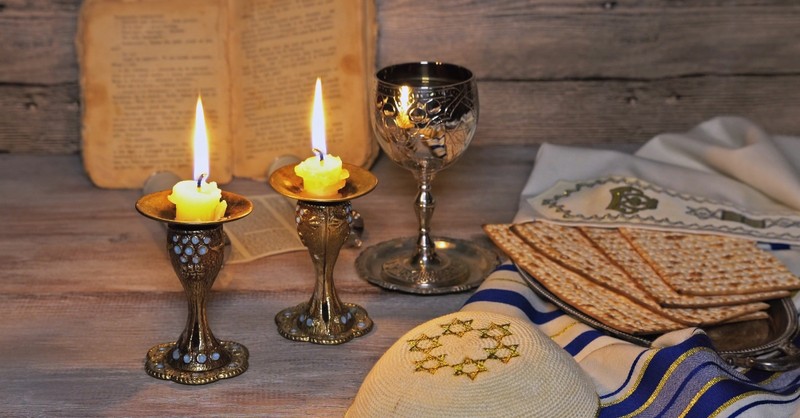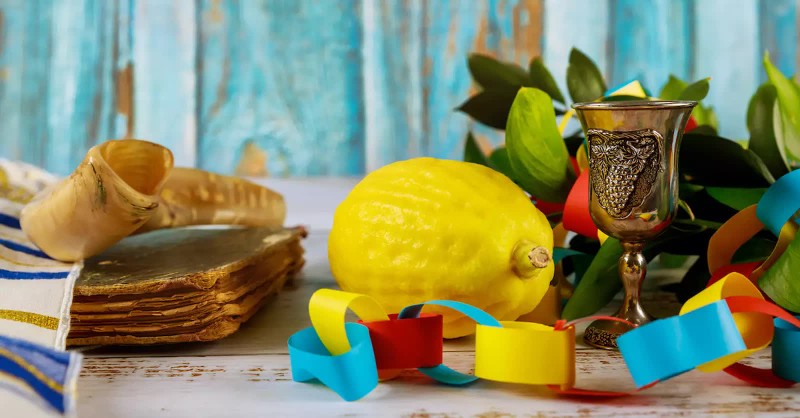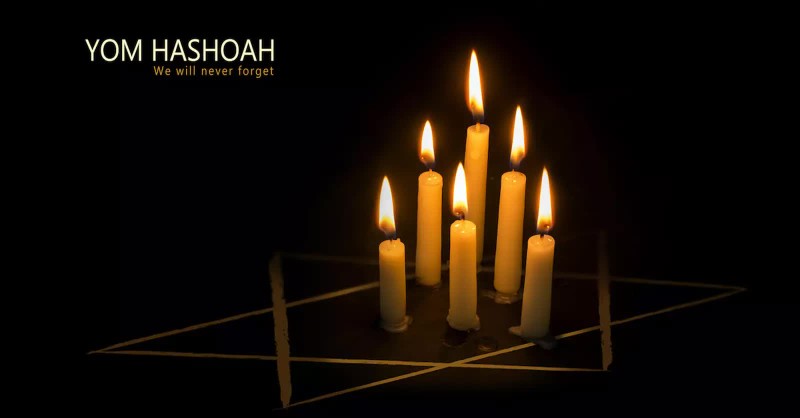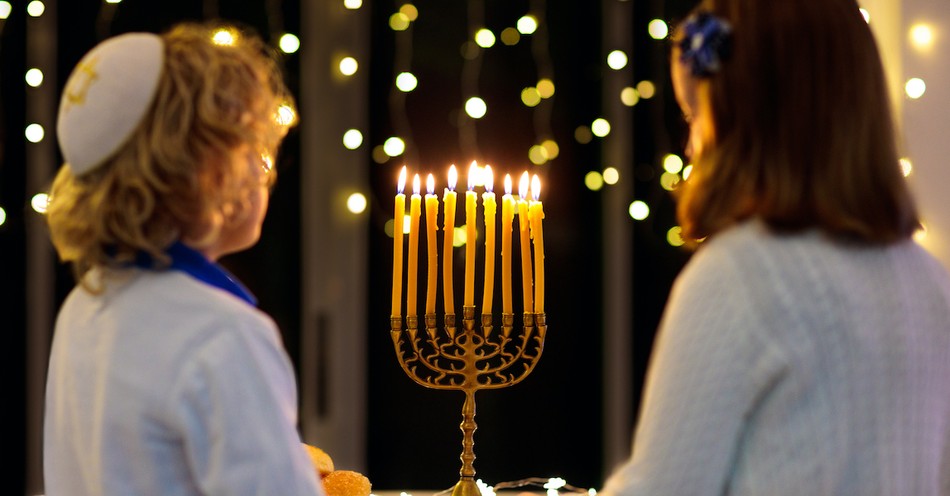The Jewish faith is one of remembrance. Practicing Jews celebrate and observe many days and seasons throughout the year that hold significant importance. As Christians, our faith is deeply rooted in the Jewish tradition – Jesus and His apostles were observant practicing Jews – yet most of us know very little about the meanings and symbols within these holidays that continue to be practiced.
Should Christians Celebrate Jewish Holidays?
The short answer is that as Christians we are not in any way required to celebrate Jewish holidays. However, there is a beauty and a richness that comes from at least a familiarity with them, and it is up to each family to decide whether to observe these or not. In Genesis 12:3, God speaks to Abraham, saying, “I will bless those who bless you, and whoever curses you I will curse; and all peoples on earth will be blessed through you.” As Christians, we are not bound to Judaism, but we do well to at least honor and respect these traditions that even Jesus Himself observed.
Photo credit: ©GettyImages/FamVeld
Here Are 10 of the Most Important Jewish Holidays:
1. Hanukkah
“Then came the Festival of Dedication at Jerusalem. It was winter, and Jesus was in the temple courts walking in Solomon’s Colonnade.” - John 10:22
We will start our list with Hanukkah, as it is perhaps the best-known Jewish holiday to those who are not otherwise familiar with Judaism. Hanukkah, which is translated as ‘dedication,’ is a beautiful story of God’s provision for His people and represents His continued presence in the most trying of circumstances.
The story of Hanukkah is found in between the OId and New Testaments, as the balance of world power shifted from East to the West once Alexander the Great conquered the known world. 175 years before the birth of Christ, Judah found itself under the harsh rule of Greek ruler Antiochus Epiphanes, who took over the Temple in Jerusalem and converted it to a temple for pagan gods.
With this desecration of the Temple and the harsh treatment of the Jewish people, Jewish forces led by Judah Maccabee led a rebellion against the Greeks and drove them from Jerusalem in 164 BC. When rededicating the temple to the worship of God, there was only enough oil left to light the Temple’s candelabrum for one day. Yet that single days' worth of oil burned for eight days, and this miracle became what we now know as a festival celebrating the victory of light over darkness.
In spite of its popularity, Hanukkah is a minor holiday compared to others discussed here, such as Passover or Yom Kippur. Regardless, its proximity to Christmas and its symbols of the menorah and children playing with a dreidel have become familiar and made the Festival of Lights an enduring symbol.

2. Passover
“On the first day of the Festival of Unleavened Bread, the disciples came to Jesus and asked, “Where do you want us to make preparations for you to eat the Passover?” - Matthew 26:17
If you have celebrated Communion (or the Lord’s Supper) at your church, then you have celebrated a portion of the Passover meal. Christians may observe this at any time, but in Judaism the whole meal, or seder, is more complex and happens only once a year. The word ‘seder’ means order, and the meal is indeed very ordered and very structured, which has ensured that the meal has remained the same for thousands of years.
This observance happens in the Spring and recalls the exodus from Egypt. It revisits the miraculous acts of God that finally convinced Pharaoh to ‘let the people go’ and freed Israel from slavery.
During the Passover, no leaven (yeast) is eaten, and the house undergoes a ceremonial cleaning. The fact that this important celebration takes place in the home mirrors the very first Passover, when the Hebrew people remained in their homes as God worked out his final plague in Egypt: “On that same night I will pass through Egypt and strike down every firstborn of both people and animals, and I will bring judgment on all the gods of Egypt. I am the LORD. The blood will be a sign for you on the houses where you are, and when I see the blood, I will pass over you. No destructive plague will touch you when I strike Egypt. ‘This is a day you are to commemorate; for the generations to come you shall celebrate it as a festival to the LORD—a lasting ordinance.” - Exodus 12:12-14
Among the important symbols are the four cups. At the seder meal, four cups of wine will be consumed by the adults, and each has a special significance: The Cup of Sanctification, The Cup of Deliverance, The Cup of Redemption and The Cup of Praise. The cup we drink at a Christian Communion service is the third cup, the Cup of Redemption. Here is how we see it in the Gospels, “Then he took a cup, and when he had given thanks, he gave it to them, saying, ‘Drink from it, all of you. This is my blood of the covenant, which is poured out for many for the forgiveness of sins. I tell you, I will not drink from this fruit of the vine from now on until that day when I drink it new with you in my Father’s kingdom.’ When they had sung a hymn, they went out to the Mount of Olives.” - Matthew 26:27-30
Jesus is claiming to be the fulfillment of the third cup; that the redemption of Israel, and by extension the world, was being fulfilled. It is believed by some (myself included) that the following cup that He refuses to drink from is the fourth cup, the Cup of Praise. He leaves this cup as the promise of His return and restoration of all things.
Of course, keep in mind that from the Jewish perspective Jesus is not the Messiah, these cups do not point to Him, and therefore a practicing Jew would reject and resent these applications.
Photo credit: ©GettyImages/photovs
3. Rosh Hashana
“Create in me a pure heart, O God, and renew a steadfast spirit within me. Do not cast me from your presence or take your Holy Spirit from me” -Psalm 51:10
While many of us consider January 1st to be the New Year, the Jewish New Year is celebrated on Rosh Hashana, which is in the early Fall. This day is considered to be the day that Adam and Eve were created in the garden and humans began their time on earth. According to the Jewish calendar, the current year is 5781, meaning that Adam and Eve were created that many years ago.
The standard greeting on Rosh Hashana is, ‘L'shana Tova’ which translates roughly as ‘good year’. It is a prayer for the year ahead, as each year Jewish people pray to be granted another year and to be ‘created’ clean again much as Adam and Eve were created clean and free from sin. It is a day of judgment, and a day of hope for what is to come.
“While the decision for "another year of life" is handed down on Rosh Hashana, the verdict is not "sealed" unto Yom Kippur. Therefore, the 10 days from Rosh Hashana to Yom Kippur are a crucial period when most peoples' judgment ‘hangs in the balance.’”
Our next holiday, Yom Kippur, falls 10 days after Rosh Hashana and is a solemn and important day.
4. Yom Kippur
“The tenth day of this seventh month is the Day of Atonement. Hold a sacred assembly and deny yourselves, and present a food offering to the LORD.” - Leviticus 23:27
Yom Kippur is the holiest day for the Jewish people. It is observed by a 24-hour fast begins just before sundown (when the Jewish day begins) and lasts until the following sundown.
The day finds its beginning in the Sinai desert. After Moses came down from the mountain to find the people had made an idol of a golden calf, he pleaded with God to forgive the people of this horrible sin. On Yom Kippur, Moses brought the second set of tablets down from the mountain, representing ‘a clean slate’ and a day of forgiveness for God’s people (Exodus 20).
While another year of life is granted on Rosh Hashana, the verdict is ‘sealed’ on Yom Kippur.

5. Sukkot (Tabernacles)
“The LORD said to Moses, “Say to the Israelites: ‘On the fifteenth day of the seventh month the LORD’s Festival of Tabernacles begins, and it lasts for seven days. The first day is a sacred assembly; do no regular work. For seven days present food offerings to the LORD, and on the eighth day hold a sacred assembly and present a food offering to the LORD. It is the closing special assembly; do no regular work.” - Leviticus 23:33-36
The feast of Sukkot, also known as the feast of tabernacles, is another remembrance of the exodus, and God’s deliverance from Egypt. This day falls five days after Yom Kippur, and is a time of great joy, for God has granted a new year, and continues to provide for his people. It is a festival of harvest and provision from God and is a week-long celebration.
During this holiday, Jews build ‘sukkots’ which are booth or tent-like structures commemorating the temporary structure Israel lived in during the exodus from Egypt.
6. Purim
“For if you remain silent at this time, relief and deliverance for the Jews will arise from another place, but you and your father’s family will perish. And who knows but that you have come to your royal position for such a time as this?” - Esther 4:14
Throughout the history of Israel, there are those who would seek to destroy it. Yet God continues to sustain and deliver His people. Purim is the celebration of yet another one of these times of deliverance.
The best background is to read the book of Esther, which records the events leading up to this deliverance. This is a tradition among Jews on the feast of Purim, as the book of Esther is clearly read. At each mention of the name ‘Haman’, the man who plotted the Jews’ destructions, it is custom to hiss or make a noise mocking him.
The day ends with a festive meal, celebrating the people Haman sought to eliminate, but instead bringing about his own destruction.
Photo credit: ©GettyImages/photovs
7. Tisha B’Av and the Three Weeks
“On the seventh day of the fifth month, in the nineteenth year of Nebuchadnezzar king of Babylon, Nebuzaradan commander of the imperial guard, an official of the king of Babylon, came to Jerusalem. He set fire to the temple of the LORD, the royal palace and all the houses of Jerusalem. Every important building he burned down.” – 2 Kings 25:8-9
In contrast with the celebration and joy of Hanukkah and Purim, this major feast is a mournful, solemn period in Jewish life. The three weeks represent times in history when the most calamity has fallen upon the Jewish people. The observance begins on the 17th of Tammuz and ends on Tisha B’Av (the 9th day of the month of Av), and these days of the Jewish calendar occur within in the summer months on our January-December calendar. This period is also referred to as the period "within the straits", found in Lamentations 1:3 " all her persecutors overtook her between the straits".
During these three weeks, no celebrations are held and there are no music, haircuts, or weddings.
On Tisha B’Av, the following tragedies have occurred in Jewish history:
-During the time of Moses, Jews in the desert accepted the slanderous report of the 12 Spies, and the decree was issued forbidding them from entering the Land of Israel. (1312 BC)
-The First Temple was destroyed by the Babylonians and Nebuchadnezzar. (586 BC)
-The Second Temple was destroyed by the Romans. (70 AD)
-The Jewish Bar Kochba revolt was defeated by Roman Emperor Hadrian. (135 AD)
-The Temple Mount was plowed under, and Jerusalem was rebuilt as a pagan city.
-The banishment of all Jewish people from England in 1290 by King Edward
-the expulsion from Spain in 1492,
-the outbreak of World War One in 1914,
-the mass deportation of Jews from the Warsaw Ghetto in 1942.
This observation is truly a time of mourning, remembrance, and of sorrow for the calamities that have befallen the Jewish people throughout history.

8. Yom HaShoah (Holocaust Remembrance Day )
Holocaust Remembrance Day is observed each year on January 27, as we remember what is considered the most striking and widespread act of racial hatred to occur within the last 100 years. As the Jewish people have faced persecution throughout the centuries, this is the most known to us as there are many still living who experienced it.
The Holocaust is often referred to as the “Shoah” which is the Hebrew word meaning ‘catastrophe’. A rallying cry on this day is ‘never again’. It is truly our prayer that this type of event never again happens to the Jewish people, or any people for that matter.
The day is observed by lighting candles, often 6 candles for the 6 million Jews murdered in the Nazi concentration camps.
9. Shavuot
Shavuot, or the Feast of Weeks, comes on the 50th day after the Passover and commemorates Moses receiving the law on Mt. Sinai. The name “Feast of Weeks’ comes from the seven weeks between this day and Passover (7 days of 7 weeks =49).
The Greek word for this holiday is Pentecost, which means 50, and this is the name that is more familiar to Christians.
During Shavuot, Jews read The Ten Commandments to commemorate the giving of the Law to Moses, and the Law takes center stage. Some Jewish people may decorate their homes with flowers, and drink milk, as the Jewish people received the Law as newborn children.
The Christian significance is that this is the holiday when the disciples were gathered in Jerusalem and received the Holy Spirit:
“When the day of Pentecost came, they were all together in one place. Suddenly a sound like the blowing of a violent wind came from heaven and filled the whole house where they were sitting. They saw what seemed to be tongues of fire that separated and came to rest on each of them. All of them were filled with the Holy Spirit and began to speak in other tongues as the Spirit enabled them” -Acts 2:1-4.
To the Christian, this event is the follow up to the Passover promise of Christ: as He fulfilled the promise of the third cup, this is God replacing His Law with a new Law that would dwell within us through His Spirit.
Again, this interpretation is clearly rejected by the Jewish faith.
Photo credit: ©GettyImages/fermate
10. Yom Yerushalayim (Jerusalem Day)
“How can we sing the songs of the LORD while in a foreign land? If I forget you, Jerusalem, may my right hand forget its skill. May my tongue cling to the roof of my mouth if I do not remember you, if I do not consider Jerusalem my highest joy”. - Psalm 137:4-6
Finally, we come to Yom Yerushalayim, or Jerusalem Day, celebrates the reunification of the city of Jerusalem, capital of Israel under Israeli sovereignty in 1967.
Jerusalem ceased to be Israel’s capital when the Roman army attacked and destroyed much of Jerusalem in 70 A.D. It was not until 1967 that the people had returned to the land and re-established a united Jerusalem as the capital of Israel, the city where King David established his kingdom and where Solomon built the Temple.
Some Jews outside of Israel view this day as troublesome, as Jerusalem continues to be the center of conflict for many nations, yet for others it is a day of celebration, as Jews are now free to pray at the Western Wall that has stood since before the time of Christ.
There is such beauty in these Jewish holidays, and you may now see that Christians are observing some of them, within a different layer of meaning, without even realizing it! As in all things, we approach our Jewish neighbors with respect and dignity while speaking intelligently of the holidays that are precious to them, just as they were precious and meaningful to the first Christians.
As more Christians explore the beauty and meaning behind biblical feasts, the line between honoring history and confusing theology gets harder to navigate. Are these celebrations enriching our faith—or complicating our understanding of grace? Join the conversation on Crosswalk Forums!
Sources:
- Aish.com, "What Are Tisha B'Av & the Three Weeks?"
- Aish.com, "A Quick Overview of the High Holidays"





